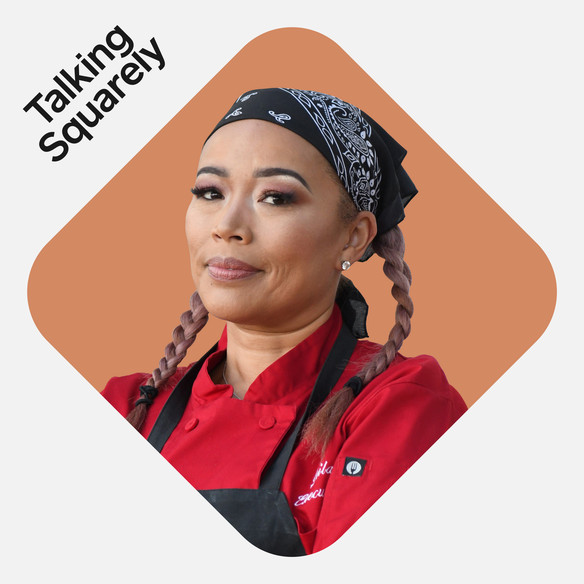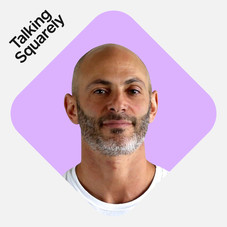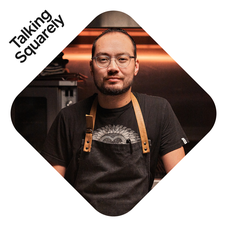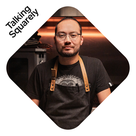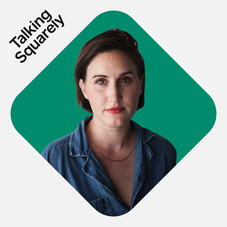Table of contents
A little bit about this episode on the importance of online selling…
*For many businesses, selling online is no longer a nice-to-have, it’s a need-to-have. Instead of measuring success in foot traffic, businesses are thinking about clicks and online orders for the first time, which comes with its own challenges, many of them unanticipated or not previously considered. We speak with three business owners to discuss the reality of creating a successful online arm of their business when their previous focus was running and growing their brick-and-mortar locations. *
This episode features Chef Leilani Baugh, owner of Roux and Vine in Oakland, CA; CJ Barone, owner of Empire Tea & Coffee in Newport, RI; and David Velasco, owner of The Mellow in San Francisco, CA. Want to know a little bit more about our host? Follow Square’s Nelson Murray for more.
Creating an online component for a business presents new opportunities, but also new challenges for even the most experienced business owner. For small business owners everywhere, the pressure to try eCommerce and connect online grew quickly as COVID-19 forced in-person interactions to slow or stop altogether.
“The eCommerce was going to have to come whether the pandemic came or not, and I think that’s just the sign of the times of where we are right now.” says Roux and Vine Chef and owner Leilani Baugh, “And when we were finally given the green light to open the restaurant for pickup and curbside, we realized that social media just wasn’t enough. We knew immediately that we needed to go online and it took some time for us to figure out exactly how to do that.” Roux and Vine is a catering company which meant that when the pandemic hit, business came to a complete halt.
Empire Tea & Coffee owner CJ Barone, on the other hand, says his business was already developing a mobile app that had just launched when the pandemic hit.
“We were getting maybe thirty transactions a week between all of our locations until the pandemic shut us down and we went to a mobile strategy and also quickly put up a website for pickup orders.” he says. The business went from having a website for shipping to fully optimizing for curbside pickup or walk up pickup overnight.
David Velasco, owner of The Mellow, launched his business right before shelter-in-place set in for San Francisco in March of 2020. Rather than start online, he and his wife chose to open a brick-and-mortar store first, wanting to prioritize connecting with the community. As an immigrant he felt it was important to build a community where they would be operating a small business.
“And then two weeks into opening, which was great, the community was welcoming us, as we all know, the pandemic started and we have to shut down.” He says not only did they have to keep their product — a perishable inventory of plants — alive, but their business as well. “So let’s get into work and we just roll up our sleeves and started just building our backend and then the front end. And we were able to launch at the end of April, yeah, our online store. A lot of work, it was definitely a lot of hours.”
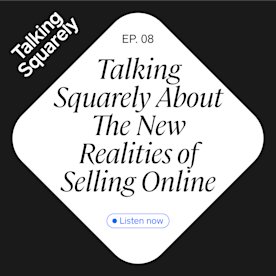
Talking Squarely, a Podcast by Square
There isn’t one playbook for running a business and the decisions business owners face are rarely straightforward. Every other week, we’ll bring together independent business owners to have frank discussions and share their perspectives on some of the most pressing issues impacting their lives—from the changing rules of commerce to work-life balance.
Spotify | Apple | Google | Stitcher
Full transcript below:
Chef Leilani Baugh:
The eCommerce was going to have to come whether the pandemic came or not, and I think that’s just the sign of the times of where we are right now. I think that it is absolutely where we need to be and where we need to go and I’m really excited about what other kind of things are going to come down the pipeline in terms of making sure that our customers are connected with us.
Nelson Murray (host):
Hi, I’m Nelson Murray, and this is Talking Squarely. In this series we bring together independent business owners to have frank discussions and share their perspectives on some of the most pressing issues impacting their lives and livelihoods. Today we’re discussing the realities and challenges that come with launching an online store and how 2020 in particular has impacted many businesses eCommerce strategies and roadmaps throughout the country.
To kick off the conversation why don’t we just start with a sort of broad question, which is help us understand when each of you realize that you needed to add an eCommerce component to your business and how you came to that decision?
Chef Leilani Baugh:
Well, traditionally Roux and Vine is a catering company. So I have the catering company and the restaurant and when the pandemic hit, all of our catering just completely stopped, period because no one was in need of it anymore.
Nelson Murray (host):
That’s Chef Leilani Baugh of Roux and Vine in Oakland, California.
Chef Leilani Baugh:
And when we were finally given the green light to open the restaurant for pickup and curbside, we realized that social media just wasn’t enough. We knew immediately that we needed to go online and it took some time for us to figure out exactly how to do that.
Nelson Murray (host):
For our second guest, David Velasco getting his plant business online was also an immediate need.
David Velasco:
So we opened the store on March, 2020. And then two weeks into opening, which was great, the community was welcoming us, as we all know, the pandemic started and we have to shut down. Shelter-in-place was first in the country in San Francisco. So it was kind of scary times and we just went into action mode and trying to figure out how to first of all keep our product, which is plants, alive. And then also how it was going to be for us the next couple of months, and everything was just so uncertain. And I think first of all it was just a matter of, “Okay, we do retail and we do have some technologies at hand that we can use for this.” So let’s get into work and we just roll up our sleeves and started just building our backend and then the front end. And we were able to launch at the end of April, yeah, our online store. A lot of work, it was definitely a lot of hours.
Nelson Murray (host):
For CJ Barone, our third guest and owner of Empire Tea & Coffee in Newport, Rhode Island, eCommerce efforts were already underway before the pandemic hit.
CJ Barone:
So for us, we started to develop a mobile app about a year ago and we had it launched, but we were getting maybe thirty transactions a week between all of our locations until the pandemic shut us down and we went to a mobile strategy and also quickly put up a website for pickup orders. We had always had a website for shipping but to the switch to a curbside pickup or walk up pickup strategy was something we implemented literally overnight and has had amazing success for us.
Nelson Murray (host):
That process sounds like you understood the need for an eCommerce component or at least a digital way for your customers to engage with your business will far before the pandemic.
Can you tell us about what the ideas were that led to that decision to invest in developing your own app?
CJ Barone:
I guess I should start with my background, I’m an electrical engineer who happens to open a coffee shop with some friends, so I tend to be fairly technical to begin with. And I think that just noticing that the customer base was changing and we knew we were watching other players in other industries moving to a mobile strategy. So a year or so ago, we started searching out partners that could integrate in with our Square ordering system so that we could put our store in people’s pockets basically. And we were working on it and it was kind of like a little pet project. Obviously, when things switched, we had this application that we could then start to really promote and push and change pretty much how we operate today. And I don’t expect wherever we’re going to go back to the way we were.
Chef Leilani Baugh:
Was that difficult, was it a long process? I mean, how did you build the framework on it?
CJ Barone:
So we actually used one of the Square partners Craver to do it, and it was a really easy process. I think the other thing that I’ve been doing personally, is I can suck in all the data and I do a lot more business analytics than what we can do on just the base Square reporting. But yeah, I recommend the app, it’s phenomenal.
Chef Leilani Baugh:
That’s awesome, okay.
Nelson Murray (host):
I’m curious David, to bring it back to you. Can you talk about the mindset shift from moving from an exclusively brick and mortar way of doing business and engaging with your customers and your products really, to adding this digital component, this eCommerce component?
David Velasco:
We knew we had to build our eCommerce but we decided to launch first, go with the store and the retail. We wanted to connect one-on-one with our community. I’m an immigrant, I come from Spain, I moved to San Francisco ten years ago and my wife is half Mexican. So for us, it was really important to build community in the mission, which is an iconic district in San Francisco. And then basically what happened is just the pandemic kind of just made us kick in gears and just get this started, but it was something we knew we had to have ready at some point, it just accelerated things for us basically.
And right after we launched our site, it was kind of just – orders were starting to pour in because there was nothing else going on in the city. Folks are staying at home and they want to spruce up their interior and of course, plants is kind of the most obvious and sustainable way to do that inside. So having a retail online and being able to fulfill orders, deliver it locally instead of shipping was very important, I think not only for us, but also for our community.
Chef Leilani Baugh:
So we had barely opened our doors at Magnolia Street when the pandemic hit, we were actually waiting for our final inspections to go through when the city shut down, so we had to wait until the city opened. And so for us, as soon as we were able to start doing curbside and pick up, we went back to my old school pop-up mode, because I used to do pop-ups and that’s what we started doing because we couldn’t open the restaurant, and that’s where all of our social media driven marketing went into effect. And then we started getting calls saying, “Hey, where’s your menu? Can we buy online? Can we order ahead?” And so I was like, “We have to set up a Square shop.”
And it’s unfortunate that it took us so long to kind of get the hang of it, but coming from not being open and not having any foot traffic to, “Okay, what do we do right now? We’ve got to figure it out.” It took us some time, but we’re finally ready and I already know just based on customer feedback so far, it’s been, “Hey, if you guys had everything online, it would be so much easier.” Because even though we’re open for outside, you’d still have the people that are like, “I’m not coming outside. So I need you to deliver my food.”
Nelson Murray (host):
I think it’s fascinating that you had to go sort of way back and way…sort of stepping into the future in order to find that way forward. And you encountered some technical hurdles, some things that you found were maybe more difficult than you expected.
Can you describe a little bit more some of those technical challenges, things that you hadn’t realized that you’d have to deal with or maybe things that you wish that the tools could have done a little bit more easily for you?
Chef Leilani Baugh:
I think that it was more so on the user end over here and for the people that manage my website, it was kind of like, “Well, how do we do this? How do we add this? Do we do a whole entire page that goes directly to Square? How does it happen?” The interesting part is that because catering has always been our bread and butter, my husband always says, “The catering is what brings the money in and the restaurant’s your hobby, honey.” and we had to quickly turn that around because there was no catering. So the technical difficulties that we had on our side was trying to figure out how to integrate things. Once we were finally, our hands being held a little bit and showing us the way on how to integrate those things, it became a lot easier. I think we’re over the hump and ready to rock and roll.
Nelson Murray (host):
I have to imagine that the struggles that you’re describing have been shared by any number of millions of independent business owners over the course of the year who have had to adapt to trying to figure out for their own business and their own inventory or services, whatever it is they provide how to recreate a version of their business online.
CJ, you had a little bit of a cheat code because of your technical background, so you maybe had fewer technical hurdles to overcome but can you talk about that adaptation and maybe any friction points that you did encounter in developing the app and in bringing a version of your business online for customers?
CJ Barone:
Sure, so in developing the app, and we definitely did have some hurdles to go through to make it all work – I would say that as soon as we switched over I could tell that our app wasn’t fully vetted for every single menu option and item on there. We had a couple dozen, when we add in every option we probably have thousands on our normal menu. So it became something that very quickly, every single day I was modifying the app or Square to solve some of these problems and get everything linked in correctly, or to make sure that modifiers and options were in for the customers. I think the other parts of it were just the operational challenges of switching from – our busiest store would have, let’s say four hundred transactions in a day prior to the pandemic, and then afterwards cut in half, but they’re now all online. And that was interesting because normally at our coffee shop on a busy day you could have a line to the door for three or four hours. And now with the online ordering, everybody’s at the front of the line.
And so inside of our store, our KDS system, all of a sudden the normal peak hours, you’re just hearing “ding, ding, ding, ding, ding” and you’re getting overwhelmed by these orders coming in. So I think it’s kind of interesting, our sales are down but it feels – but it also, it is an invigorating experience because it is a new challenge to overcome.
Nelson Murray (host):
David, you touched earlier on how adding plants to your home is one thing that is sort of top of mind for people who are looking to refresh their space or kind of breathe new life into their home. I’m wondering how you decided to bring coming to The Mellow in person to your online audiences?
David Velasco:
On our website we have plant bios. We were building just kind of, where does the plant come from, doing care tips. How does the plant behave and how does it move? So we have little videos, animated things, optimizing beautiful images for sure was a must, we had to have that. And being descriptive with what the product is, because it’s a personal purchase. People want to be somewhere, look at this, to see how they feel about it and then purchase it.
And what’s difficult though for us is that in store we use Square for our POS system. Whereas online, we connect the Square API with our eCommerce provider, which is WooCommerce, and then we use a different payment processing company for online. So there’s quite a few parts moving and being able to sync all of those, that everything is synced constantly, that’s kind of the difficulties that we run into, just at this junction between in-person and online too. And the customer expectations also are a little bit different when it comes to something online, they think immediately they want refunds, full refunds. They want to be able to return quickly. They want to know ETA for deliveries like all the ride sharing apps can do.
Nelson Murray (host):
I’m curious if you could expand on what else have you had to do to adapt your business model to sort of supporting both the physical in-store experience as well as the online experience, things like your social media presence and kind of other peripheral channels that you use to communicate with your customers and drive traffic?
David Velasco:
Social media is key for us. Well, actually thirty eight percent of our visitors come from a social media channel and then we have a big organic presence too, sort of the grassroots kind of marketing campaigns that we have done locally. Just being able to target our customers based on demographics, such as age what they like, if they’re outdoorsy versus not, if they’re into interior design or they’re already into plants and they like that. It definitely has givien us a step ahead with our competitors and we’ve been able to cater and craft a really good marketing strategy.
Nelson Murray (host):
Chef Leilani, you talked about the process of bringing your menu to your Square website. I’m curious now, is that the sole channel that you are measuring success through for your business, or are you also using your social media channels and other avenues to market your businesses and stay in touch with your customers?
Chef Leilani Baugh:
I do have a pretty good social media following, which surprised me. It’s always very funny when someone says, “Oh my God, I follow you on Instagram.” and I’m like, “Really? Oh, that’s awesome.”
Nelson Murray (host):
You’re huge on Instagram, what are you talking about?
Chef Leilani Baugh:
We literally did everything on Instagram and Facebook and it was every time a new menu came out, we pushed that menu. Anything that I was participating in, we pushed and pushed and pushed to get people to know a) that we were open for pickup and curbside and b)that they were going to get some delicious food. And because we do Cajun Creole and southern comfort in these unprecedented times, people are constantly looking for comfort and comfort normally comes in the form of hugs and food. I mean, we have people coming from San Jose and Sacramento based off of an Instagram post.
So it’s been wild because we, like CJ, our profits are down but we do seem a lot busier because there’s all these other components, right? It’s just not, “Hey, let’s order food for catering.” Everything’s individually packaged, that takes a whole ‘nother hour and a half to do when you’re doing six hundred meals a day. Like today, we’re doing four hundred and eighty meals and it’s going to take an hour to pack if not more.
Nelson Murray (host):
Right. CJ, I’m curious about you, you explained earlier you sort of kicked off this idea of, regardless of what’s happening with sales, you’re feeling busier than ever. How have you had to reshape the way that you use your staff at your business to embrace this, not just the app, but your eCommerce model.
CJ Barone:
So a lot has changed due to this. We’re not allowing anyone into our stores, I think even though we are technically allowed to at this point, so we’re strictly just take out. And I think the biggest changes have been reconfiguring the stores. They used to be a spot for our community to come in and interact with each other and with us, and now we’ve optimized them to be as efficient as possible to serve as many items as possible. So I think some of the things we’ve changed, we’ve added in an expediter station, which is a thing is more normal in a traditional restaurant than it is in a coffee shop but we had to add that in because the orders are coming in so rapidly.
Nelson Murray (host):
What has surprised you about this big pivot to embracing an eCommerce model? What has surprised you about shifts in your sales, changes in the way that you sort of relate to your own business maybe?Are there things that are measurable or immeasurable that are just new to you?
CJ Barone:
From more of an emotional side of things, our stores were always meant to be community hubs, where people came in and we interacted with them and we got to know them and create relationships. So that’s been an interesting thing of, how do we continue to do that? So writing notes on cups and bags and interacting more on social media. And then also on our app, putting pictures of our staff and their favorite drinks, so there’s a way that they can get to know us, even if it’s between plexiglass and a face mask.
Nelson Murray (host):
And David, what about for you at The Mellow?
David Velasco:
The support of our community was overwhelming. We literally had so many orders we had to expand. We started with delivering one day a week, then two days a week, then three days a week. So having that was surprising and seeing how much people really wanted that and were just willing to take the leap also into doing online shopping for their plants. And also, yeah, there’s the emotional side of community, which is still our main focus and we’re having to do it very differently through social media, through live streams. We bring music every Saturday and safely put the musicians outside in the street and we pay them and the community shows up and tip them. It’s overwhelming, and it’s a blessing just to see and be able to still connect with a lot of people even though the times we live in are really hard.
CJ Barone:
I was curious about from David was, our latest integration is for inventory, where you don’t have the same inventory issues that maybe plants would have, clients would have. But we do have it for like baked goods, we don’t want to run out. How are you integrating between your in store and your website, the inventory control?
David Velasco:
Sure, yeah, so it’s been kind of difficult to figure it out and to run it smoothly, especially because, like I said, it’s two different products. The backend of our website is PHP and then WooCommerce. and then in store the POS is Square. So synching with the Square API has allowed us to refresh and kind of keep updated our inventory. There’s some glitches here and there but as soon as we were able to just connect them through the API, now we have a stable system in which when I update the stock in Square, it also updates on our website. And we have a lot of variations because a plant can be different sizes, but also different varieties. So that was kind of challenging, but we were able to build it really well on our website.
Nelson Murray (host):
I’m curious as you all three, look to the future, now that you have invested in eCommerce presences for your businesses, what are some of the things that you have in mind for additional changes, things that maybe you’re not quite ready to take on quite yet, but that you think might be interesting for the future.
CJ, let’s start with you.
CJ Barone:
I think that switching to this process allows us to connect to our customers more offsite, we’re learning new skills on how to interact with them through our loyalty program, through notifications on the app. Even the messages that we put out when their order is ready to pick up, it just allows us to interact a little bit more, to get to know our customers a little better so that we can cater more specific to their wants and needs. So I think that that’s going to be a growth driver going forward.
Nelson Murray (host):
Well, David, let me turn back to you. Let me turn that question to you. What are some things that as you look to the future that you think might be interesting opportunities for The Mellow as it relates to now having this robust eCommerce presence?
David Velasco:
We are building a more comprehensive, programmatic SMS system, which we’ve had since we launched. And it was kind of just for fun at first, and to be able to notify on a timely manner, but then it became something people really liked and wanted to interact with. So being able to allow them to purchase from their messages has been a key for us now, so we’re still building that. Then we’re so excited we’re going to open our second store in the city, so that’s very exciting and it’s going to be a lot of work.
Nelson Murray (host):
Congratulations.
David Velasco:
But we just need the space – yeah, thank you – and then we’re looking into expanding into online workshops. So when we opened the store, initially we wanted to do plants and also in-person workshops with local artists and makers. We haven’t been able to do that, obviously because of the pandemic, but we’re building the curriculum and we’re hoping to launch soon.
Nelson Murray (host):
Chef Leilani, now that you have invested in an eCommerce component for your business, how are you thinking about the relationship between the physical presence and the sort of digital or virtual experience of your business?
Chef Leilani Baugh:
I mean, I think that it goes back to being fluid with what’s going on, right? So the eCommerce was going to have to come whether the pandemic came or not, and I think that’s just the sign of the times of where we are right now. and so being able to have those tools and to be able to have the assistance to get it done, because I’m not a super techie person, I cook for a living. So I can make shrimp and grits all day but I can’t really put a computer together or a website for that matter.
Nelson Murray (host):
Well, it’s, it’s interesting to hear you say that whether the pandemic had come about or not, that this kind of pivot was going to be in the future for your business.
CJ, that’s obviously the case for you as well, given that well in advance of this year you started developing your own app.
David, I’m curious what your take is on that. Do you feel like the investment and rollout of this eCommerce platform for The Mellow was inevitable and how do you feel about it personally?
David Velasco:
Yeah, I think because I have a background in technology, but also because I am a very personable individual. I think like most of the owners are thinking it’s a matter of finding balance and being a hybrid. Bottom line is, times are not going to go back fully to what they used to be and we need to adapt, it’s inevitable that businesses will have to embrace technology. And I think the amount of investment we’ve put in both shows and for that we’re just very happy, because we’re able to run our business. Yes, it’s more complicated. Yes, it has a lot of moving parts, but at the end of the day we have to connect with people and we have to do what we do best which is doing business.
Nelson Murray (host):
A special thanks to David, Chef Leilani and CJ for sharing their eCommerce strategies. The Mellow is open for both online and in store shopping with weekly updates to their plant inventory. Follow them on Instagram @themellowsf. You can find Chef Leilani on Instagram as well, @atthechefleilani or @magnoliastreetwinelounge. You can find Empire Tea & Coffee at empireteaandcoffee.com and order coffee for home delivery. You can also download their app on the app store and Google Play. Follow them on Instagram and Facebook @empireteaandcoffee.
You’ve been listening to Talking Squarely, a Square production. This episode was produced by Mallory Russell, Cindy Lewis, Kira Deutch, Evan Groll, John Scarpinato and Travis Gonzalez. Our music was composed by Jordain Wallace, I’m Nelson Murray, thanks for listening.
The views and opinions expressed in Talking Squarely are those of our guests, and do not reflect the official policy or position of Square.
![]()

